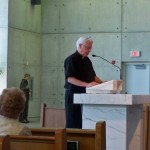WHAT MUST WE DO?
The Holy Spirit was alive and well in those early years of the church’s life. The Spirit is still alive and well and working in our church today though in different ways. Men and women heard Peter telling them about Jesus and the wonderful things he did for people. Peter told them what jealous and self-serving religious authorities did to Jesus, hanging him on a tree. The people listening to Peter were ‘cut to the heart’ and wanted to know what they were to do. Through the actions of the Holy Spirit the words of Peter touched their hearts. They came to understand who Jesus is as never before. He was more than a worker of miracles, more than a teacher of God’s love and mercy. The risen Jesus was their Lord and Christ. He is indeed the Messiah promised long ago, the Messiah who reconciles them with God their Father. So they did what Peter told them to do, they repented of their sins and were baptised.
This Sunday is Good Shepherd Sunday. We know Jesus Christ is the Good Shepherd of our lives. Jesus is the shepherd who lays down his life for us. As the psalm reminds us, Jesus is the shepherd who watches and guides us through all the difficulties of our lives. He will not abandon us.
God has blessed us with a new shepherd, Pope Francis. To say the least he is a different kind of Pope. Jesus once said of himself as our shepherd, ‘my sheep listen to my voice’. Will we listen to the voice of our shepherd Francis as he calls us to be vital and involved members of the church? Our shepherd Francis calls us to be a community of faith, an open and welcoming community to all who seek Christ. Francis calls us to be a community of love more than keepers of laws, a community that does not point figures at others but opens its arms to all those struggling to find their way to God.
Francis wants his fellow shepherds, priests and bishops, to have the smell of the sheep; the smell of people’s hurts and disappointments with other people and with their church itself, the smell of those who endure injustice and hatred and persecution, the smell of good wives and husbands confused over the teachings of the church and the reality of their own lives. The smell of men, women and children victimized by the greed and power of others. The smell of countless refugees and immigrants who seek new and better lives. The smell of those whose lives are at risk, the unborn and neglected elderly. The smell of the hopes and joys, the pains and hurts of all the people of God – which we are.
If we were to ask our shepherd Francis, as the people who asked the shepherd Peter, ‘What must we do?’ our new shepherd Francis would tell each one of us, be open to the opportunities God puts before you every day of your lives; accept those different from ourselves, seek justice and fairness for the men, women and children who are exploited in the work place, be attentive to the needs of the poor and elderly in your neighbourhood, respect and protect life in all its stages, be agents of peace in your homes and neighbourhoods, respect and protect God’s good creation and above all be people of prayer so that we may be open to the things to which Christ the Good Shepherd calls you each day. These are the smells to which we all should be attentive and to which we should respond.
Strengthened by the bread of life we will receive at this Eucharist may be willing to follow out shepherd Francis wherever he may lead us.
 Founded by St. Paul of the Cross, every Passionist takes a special vow to spend his or her energies in promoting remembrance of the sufferings of Jesus, the memory of the Cross, and reflection of the meaning of the Cross for the world.
Founded by St. Paul of the Cross, every Passionist takes a special vow to spend his or her energies in promoting remembrance of the sufferings of Jesus, the memory of the Cross, and reflection of the meaning of the Cross for the world.




